After a disappointing end to their FIH Pro League campaign, the Indian men's hockey team faces questions, but should fans be concerned? Despite finishing near the bottom after a series of losses, a closer look reveals that panic might be premature.
India entered the European leg of the FIH Pro League with high hopes, sitting third with 15 points from eight matches. However, the team managed only three additional points in their subsequent eight games, finishing second to last. This included a disheartening seven-match losing streak, with their sole victory against a weakened Belgium side.
While seven consecutive losses are undoubtedly concerning for an Olympic bronze medal-winning team, it's important to maintain perspective. Despite the unfavorable results, India was rarely outmatched. Many matches were decided by narrow margins, highlighting the team's potential.
Six of the seven losses were by a single goal. Instances such as conceding late goals against the Dutch twice and against Australia in their first match, as well as giving away goals in the final quarter in both matches against Argentina, underscore the fine line between victory and defeat. While some games saw them outplayed, others could easily have swung in India's favor.
These results, while disappointing, occurred in the Pro League, where the stakes are relatively lower. Although a World Cup spot was up for grabs, India's primary qualification route remains the upcoming Asia Cup in late August. The Pro League served as a valuable opportunity for coach Fulton to identify weaknesses and implement necessary adjustments. Historically, India has shown resilience, overcoming poor Pro League performances to excel in major tournaments like the Paris Olympics, where they secured a bronze medal.
Fulton's strategy heavily relies on a robust defense, which faltered during the European leg. India conceded 26 goals in eight matches, a significant increase from the 12 conceded in their initial home games. While the defensive unit, including Amit Rohidas, Sumit, Jugraj Singh, Jarmanpreet Singh, and Sanjay, has generally been reliable, costly errors emerged. Failed clearances, mistimed tackles, incorrect positioning, and sloppy play in the defensive area proved detrimental.
Goalkeeper Krishan Pathak's form also contributed to the team's struggles. Known for his proficiency in defending set-pieces, Pathak faced challenges, particularly with high balls. The absence of veteran PR Sreejesh, renowned for his shot-stopping abilities and clutch performances, was keenly felt. Neither Pathak nor Suraj Karkera could replicate Sreejesh's impact in crucial moments.
While wholesale changes aren't necessary, Fulton faces pressing selection decisions. His continued reliance on experienced forwards like Mandeep Singh, Lalit Upadhyay, and Dilpreet Singh has yielded inconsistent results. Conversely, Shilanand Lakra demonstrated promise, making a case for his continued inclusion.
Fulton must consider integrating young, talented attackers like Araijeet Singh Hundal, Arshdeep Singh, and Mohammed Raheel, all of whom possess international experience, into the senior team before the Asia Cup.
Despite the setbacks, a few players impressed. Abhishek emerged as a standout performer, showcasing his exceptional ball-striking ability and scoring four goals in eight matches. His contributions were particularly valuable in the absence of Harmanpreet Singh, who missed games due to injury.
Manpreet Singh continues to be a vital presence on the field. His relentless commitment to both defense and attack, even after 400 international matches, makes him a likely candidate for next year's World Cup squad.
India's focus now shifts to the Asia Cup, scheduled from August 27 to September 7 in Rajgir, Bihar. As the top-ranked team in the continent, India is expected to win the tournament and secure their qualification for the World Cup.
Newer articles
Older articles
 Raducanu Laughs Off Alcaraz Romance Rumors, Confirms US Open Doubles Partnership
Raducanu Laughs Off Alcaraz Romance Rumors, Confirms US Open Doubles Partnership
 Wimbledon 2025: Extreme Heat Forces Cooling Breaks as Temperatures Hit Record High
Wimbledon 2025: Extreme Heat Forces Cooling Breaks as Temperatures Hit Record High
 Gavaskar Calls for Kuldeep Yadav Inclusion Amid Bumrah Fitness Concerns Ahead of Second England Test
Gavaskar Calls for Kuldeep Yadav Inclusion Amid Bumrah Fitness Concerns Ahead of Second England Test
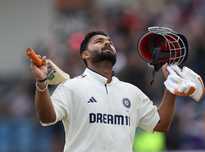 Greg Chappell: Rishabh Pant is Revolutionizing Cricket with Unorthodox Style
Greg Chappell: Rishabh Pant is Revolutionizing Cricket with Unorthodox Style
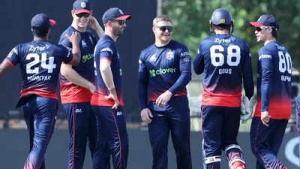 MLC 2025 Playoffs: Freedom, Super Kings, Unicorns & MI New York Vie for Title in Dallas
MLC 2025 Playoffs: Freedom, Super Kings, Unicorns & MI New York Vie for Title in Dallas
 Smith Eyes Grenada Test Return After Injury Recovery
Smith Eyes Grenada Test Return After Injury Recovery
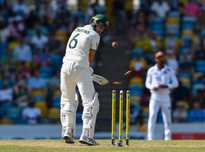 McDonald Calls for Patience as Australia Nurtures New Batting Order
McDonald Calls for Patience as Australia Nurtures New Batting Order
 Daren Sammy Sanctioned for Public Umpire Criticism, Receives Demerit Point
Daren Sammy Sanctioned for Public Umpire Criticism, Receives Demerit Point
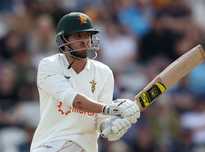 Bennett Out of South Africa Test After Blow to the Head; Masvaure Called Up
Bennett Out of South Africa Test After Blow to the Head; Masvaure Called Up
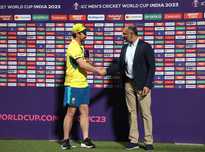 Sanjog Gupta Tapped as Next ICC Chief, Set to Helm Global Cricket Body in 2025
Sanjog Gupta Tapped as Next ICC Chief, Set to Helm Global Cricket Body in 2025